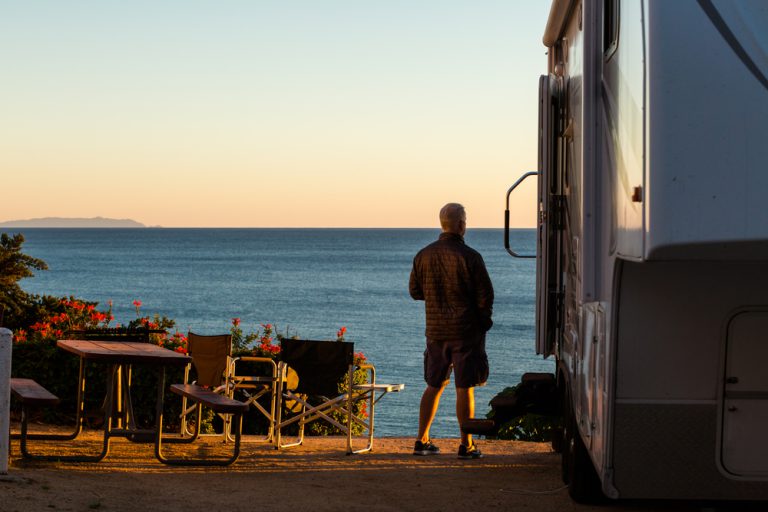
 From an experiential perspective, buying an RV is a fantastic investment. Although it’s a pretty hefty purchase, it stands to pay untold dividends in helping you become better traveled, more well-rounded, and happier.
From an experiential perspective, buying an RV is a fantastic investment. Although it’s a pretty hefty purchase, it stands to pay untold dividends in helping you become better traveled, more well-rounded, and happier.
From a purely financial standpoint, however, it’s a little harder to argue that buying an RV makes sense. After all, RV does stand for recreational vehicle — and vehicles, as you probably know, depreciate in value. (And yes, that holds true despite the fact that your RV financing probably looks more like a mortgage than an auto loan.)
Just as with other vehicles, RVs lose a huge chunk of their resale value as soon as they’re driven off the dealership lot. In fact, some sources estimate you might lose as much as 30% of the RV’s worth when you make that first fateful drive.
And that’s just the start. As the years tick on by, your RV’s real value continues to dwindle, getting smaller and smaller as you add more and more hours and miles to your rig’s total drive time.
Of course, none of that means you should give up on the dream of becoming an RV owner. Life isn’t just about finances, after all. Some things are worth spending a little bit of money on, and if you ask us, having the freedom and flexibility to see the country on your own terms totally counts.
But if you’re planning on selling or trading in your rig down the line, it might be worth making some effort to ensure you retain as much of your RV’s total resale value as possible.
So here’s a quick guide to help you learn how to find RV values so you can figure out where you stand in the RV marketplace — and also a few tips regarding what upgrades and add-ons actually help increase your RV’s worth.
Finding RV Values
Before we dig into what upgrades and maintenance issues have an effect on your RV’s total value, let’s start by learning how to find the existing worth of your rig as-is.
There are a variety of ways to estimate your RV’s resale value, but keep in mind that no number you see on the internet guarantees you’ll be able to fetch that from a buyer. In the end, anything on the market is only worth as much as someone is willing to pay for it!
However, there are a few tried and true resources to help dealers and consumers get used RV values so they have a basis from which to begin the process of pricing the RV when they put it up for sale.
Kelley Blue Book RV Values
Perhaps the most well-known way to find the resale value of cars, trucks, SUVs, and motorcycles is the Kelley Blue Book, which is the industry standard price guide for used road vehicles.
When it comes to motorhomes and trailers, however, things are a little bit different.
Kelley Blue Book actually doesn’t publish RV valuations to the general public at this time, and depending on your rig’s age, you may or may not be able to find a value from a previous edition. So in order to look up RV values, you’ll want to turn instead to the National Automobile Dealers Association’s valuations, published online as the NADA Guides.
NADA makes it easy to look up your motorhome’s value. All you have to do is provide your zip code, and then follow the easy prompts in the RV value calculator interface to help the system locate your specific RV model. You’ll supply details like your RV’s make, size, and specifications in order to help NADA come up with the most accurate value estimate possible.
And although it isn’t easily possible to find RV values by VIN, you can use that number to perform a vehicle history check through the DMV’s website, which will help you ascertain what exactly your vehicle has been through — which can be hard to know if you purchased pre-owned.
RV Cash Value
Whatever number you pulled up for your rig through the NADA Guides, again, it’s important to remember that used RV values depend on a variety of factors and you might not be able to get the full list price from a buyer. Sometimes, it can be as simple as there not being enough demand for your specific vehicle type!
But whether your rig is a Class A, Class B, fifth wheel travel trailer, or even a vintage model, there are a few maintenance issues that always affect RV resale values.
Although fancy add-ons like built-in USB ports and solar equipment are nice, they actually don’t have as much of an impact on your RV’s value as simple structural integrity. After all, a new owner can always make the minor investments to deck out and customize the rig with their own favorite technological advances after purchase… but if the rig’s got a leaky roof, that spells a whole new level of necessary spending.
Here are a few things to keep an eye on if you want to ensure your RV retains as much resale value as possible:
- The integrity of the roof. Even the fanciest RV in the world is a dud if it doesn’t keep you dry in a rainstorm!
- The integrity of seals and moving parts. Unfortunately, water damage is one of the most common (and fatal) problems for RVs of all ages. You’ll want to ensure you’re vigilant about checking every seam, seal, and slide-out for any leaks and getting them fixed as quickly as possible.
- The solidity of your RV’s frame. Some rigs are just built more sturdily than others — and that means they’re better able to withstand years of use. So when you’re first shopping for your new RV, it might be worth the money to upgrade to the most solid, well-insulated model you can find.
RV Value Trade In
Hopefully, these insights will help you understand your RV’s resale value, whether you plan to sell it back to the dealer, trade it in for a new model, or try to find a buyer on the private market through outlets like RV trader.
But no matter where your rig ends up or how much money you can recuperate in the bargain, always remember the reason you decided to make the purchase in the first place: to see new places, meet new people, and enjoy the ride.
